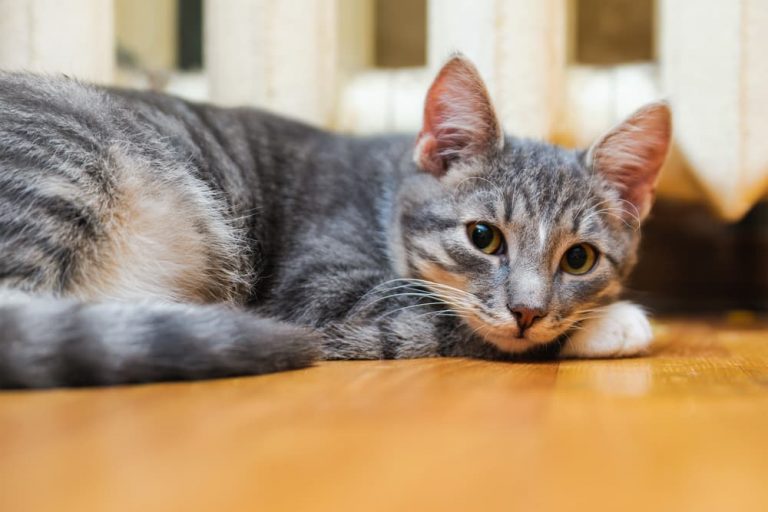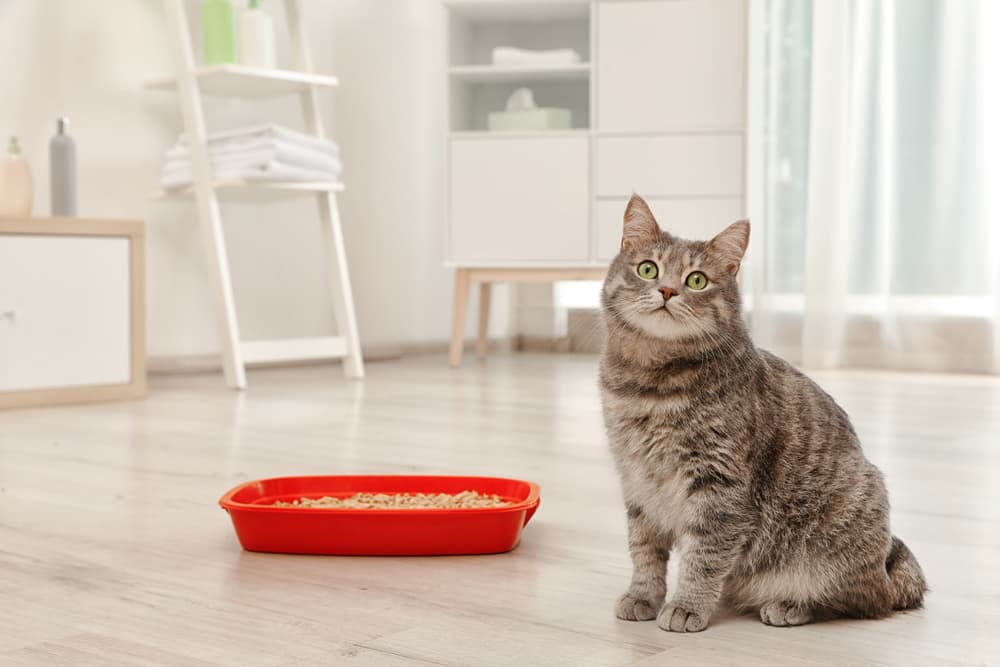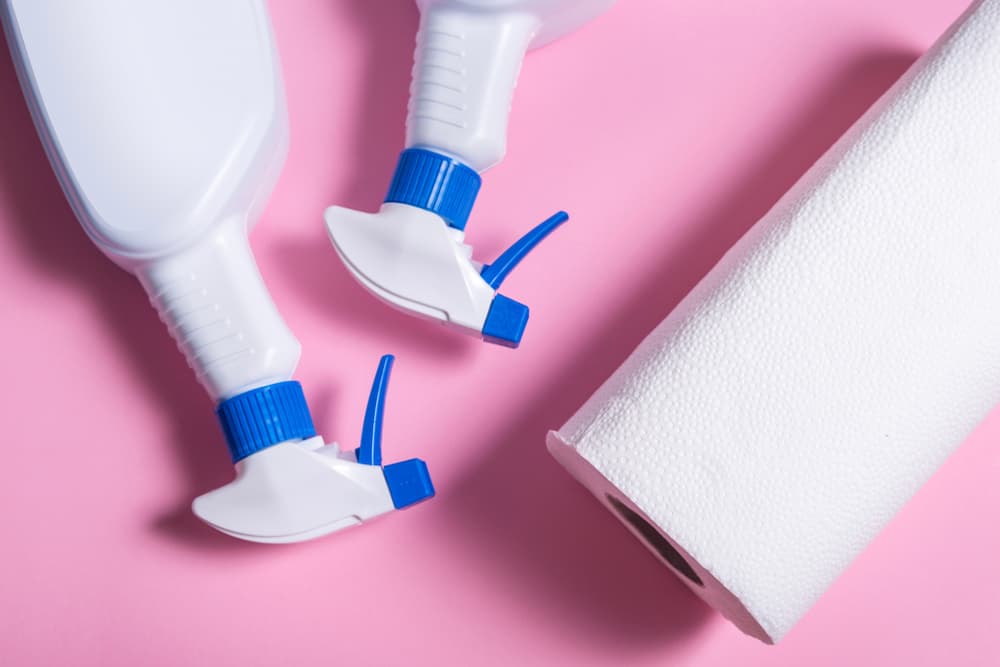Cat Pooping Outside the Litter Box: 8 Tips to Stop It

If you live with a cat pooping outside the litter box, you’re not alone. An estimated 10 percent of felines have had litter box issues at some point in their lives, according to a recent study. It’s a primary reason people surrender cats to humane societies and a top consideration in euthanasia decisions made at shelters. It doesn’t have to be like this: it’s often possible to correct the issue.
Here we offer actionable, veterinarian-approved tips (many are surprisingly simple!) for how to stop your cat from pooping outside the litter box. We also uncover the top reasons cats miss the mark, and offer tips for easy cleanup. Though these tips can be quite effective, we do recommend contacting your veterinarian if your cat is not pooping in the litter box.
Why Does a Cat Poop Outside the Litter Box?

If you have other pets, it’s quite possible your cat isn’t even the problem. “Other pets (usually dogs) can move the fecal material from the box to the favorite snacking location,” says Dr. Virginia Sinnott-Stutzman, senior staff veterinarian, emergency and critical care, at Angell Animal Medical Center in Boston.
Once you’ve ruled out other pets as the culprits, or if you only have a cat, the next step is to determine what’s causing the behavior. Here are a few possibilities to consider.
An Underlying Medical Condition
Constipation is one of the most common medical causes for a cat pooping outside the litter box, says Sinnott-Stutzman. “They started in the box, but the poop dropped outside the box as they wandered around trying to push it out.”
An old cat pooping outside the litter box may have arthritis, which Sinnott-Stutzman says can limit a cat’s ability to climb over the side of the box.
Diarrhea can result in accidents and can be a symptom of a range of diseases, including hyperthyroidism, kidney disease, and inflammatory bowel disease.
Behavioral Issues

Most often, haphazard pooping can be attributed to a behavioral issue, says Dr. Katie Pagan, a partner veterinarian with Heart + Paw in Fells Point, Maryland. “Cats are creatures of habit and any deviation from their normal routine can lead to stress. When cats get stressed they can poop (or pee) outside of the box.”
Common causes of stress, Pagan says, include relocating to a new home, introducing a new pet to the family, and loud noises. Other potential sources of anxiety include new smells, new people, conflicts with other cats, and even boredom.
Issues with the Litter Box
Cats can be quite particular about where they poop and what they poop in. Here are a few factors that can contribute to an unattractive litter box in their view.
- A dirty litter box: This is commonly why cats poop next to the litter box, says Sinnott-Stutzman, who is board-certified in veterinary emergency and critical care. “They want to go in the ‘appropriate’ place, but it is undesirable to them, so they go right next door.”
- Poor location: This is a factor in some cases but not all, says Sinnott-Stutzman. “Placement generally becomes an issue when cats cannot see out from the box while using it (which can make them feel vulnerable), whether other cats or the family dog can access the box, and thus disturb them while using it.”
- An inaccessible litter box: This is especially an issue for senior cats “if the box is placed somewhere where elderly or mobility challenged cats cannot reach it, such as the bottom (or top) of stairs,” says Sinnott-Stutzman. Also, she says, a cat pooping right outside the litter box usually means the cat made an attempt but failed.
- Not enough litter boxes: Cats are territorial creatures, so they’re not inclined to share their litter box with other cats. A scarcity of litter boxes in multi-cat households could pose a problem.
- The litter box is too small: A larger litter box allows cats to move freely and feel more secure. In one study, cats showed a strong preference for litter boxes that were larger than those they usually used at home (2).
- Unappealing litter: Cats tend to prefer litter with a soft, fine consistency, like clumping clay. With their sensitive noses, perfumed litter can also be a turnoff.
Cat Pooping Outside the Litter Box: 8 Tips to Stop It

Living with a cat pooping outside the litter box is not a good situation for anyone in your household. By applying these relatively simple tips however, it’s possible to restore order to your home.
Keep in mind that when it comes to litter boxes, preferences can vary by individual cat, so you may have to work by trial and error. Also, because there may be different dynamics at play, experts recommend contacting your veterinarian when you start noticing that your cat is not using the litter box.
Rule Out Underlying Health Issues
An essential first step is for your veterinarian to rule out any potential health issues, says Sinnott-Stutzman. “Most cats will resume their use of the litter box once the health issue has been resolved.”
Keeping those annual wellness checks is a good way to prevent future occurrences of pooping outside the litter box. “I always recommend yearly blood work for my feline patients and twice-yearly blood work once they are a bit older. Frequent checkups can catch these diseases early,” says Pagan.
As your senior cat ages, you may notice they begin to soil outside the litter box more and more. If you geriatric kitty is consistently pooping outside the litter box for no apparent reason, an underlying age-related health issue may be to blame.
For instance, if your cat has mobility issues due to osteoarthritis, stepping over a tall litter box or squatting to defecate may be very uncomfortable; arthritic toes may also feel unstable and painful in shifting litter. If your cat has diarrhea due to underlying GI disease, they may not be able to make it to the litter box in time. Senior cats with feline cognitive dysfunction (FCD), similar to dementia in humans, may occasionally forget to use the litter box properly. Furthermore, senior cats who may be very lethargic due to an underlying health issue (such as dehydration from chronic kidney disease) may feel too weak to climb into a litter box, instead taking the path of least resistance to do their business.
Speak with your vet if your older cat begins avoiding pooping in the litter box to rule out health disorders.
Keep a Clean Litter Box
Cats can become stressed when the litter box isn’t clean enough, says Pagan. “While awaiting your cat’s vet appointment for a checkup, I would first make sure you are cleaning the box enough.”
Pagan and other veterinarians recommend scooping the litter once daily and replacing it once per week. Some litter boxes are designed to automatically scoop the poop or minimize your cleaning time.
Consider Buying a New Litter Box

A litter box that works for one cat may fail with another. Fortunately, litter boxes come in a variety of styles—including covered and uncovered—and sizes to suit even the most finicky of kitties.
Any litter box you choose should be large enough to enable free movement. The general rule is that the box be at least as long as the length of the cat’s entire body.
Provide an Adequate Number of Litter Boxes
Follow the N+1 rule for litter boxes, recommends Sinnott-Stutzman. “This is the rule that you should have one more litter box in your house than you have cats (where N= the number of cats in your home), and every floor of your home should have a box. A multi-story home could mean you have more than N+1 litter boxes.”
Consider Litter Box Location
Cats are sensitive creatures who react to what they perceive as potential danger in their environment. The resulting stress can result in pooping outside the litter box. To reduce potential stressors, Pagan recommends consistently keeping the litter boxes in a quiet, stress-free area. Remember, cats may become stressed over things that don’t necessarily affect us. So while you may know that the humming and hissing from your faulty refrigerator is innocuous, your cat doesn’t.
Consider Switching Cat Litter

It may not be the litter box your cat objects to. It’s a good idea to switch to an unscented clumping litter, as cats generally prefer it, says Sinnott-Stutzman. “However if you know your cat’s preferred litter and are not using it currently you should switch back to what you know your cat likes.”
Once you do find a litter your cat likes, try sticking with it. Pagan recommends not frequently changing out the type of litter you use.
Look For Recent Changes Within Your Home
To pinpoint the reason for your cat’s stress—and thus litter box issues—Sinnott-Stutzman recommends asking the following:
- Have you recently changed your own habits? For example, working from home or returning to the office after long stretches of working from home?
- Has the litter box been moved?
- Have you changed the type of litter that you use?
- Has your once small kitten grown too large for the box?
- Have you added another cat (or dog) to the home?
“Tackling these questions is key to getting your cat back on track,” she says.
Make Sure Your Senior Cat Can Access the Litter Box
Arthritis causes pain and mobility issues that make it difficult for an older cat to climb in and out of a litter box. In this case, “Litter boxes with ramps, or lower sides may be helpful here,” recommends Sinnott-Stutzman.
When to Call Your Vet About Pooping Outide the Litter Box

If you’ve found your cat popping outside of his litter box, don’t panic. This behavior is rarely a sign of a medical emergency. Stress, environmental changes, and new litter box anxiety can all lead to this behavior. However, if your cat continues this behavior on a regular basis for several days, call your vet for further instructions.
Pooping outside of the litter box can sometimes point to a medical condition. Your vet will help you determine whether your cat has an underlying illness as well as how you might be able to get your cat to poop in his litter box again. Keep track of any changes or notable patterns of behavior you’ve noticed in your cat so you can provide your veterinarian with the most complete, accurate information.
How to Clean up Cat Poop from Carpet, Beds, or Couches

Veterinarians recommend enzyme-based cleaners to remove poop stains and their accompanying odor. Enzymes are effective because they break down the molecules in poop, making it easier to clean. And instead of just masking the odor, they break it down and eliminate it. Enzymatic cleaners can be applied to a variety of surfaces, so they’re also convenient to use.
“An example would be Nature’s Miracle, which is widely available and does an excellent job removing stains and smells from surfaces that include floors and rugs, but also beds,” says Sinnott-Stutzman. If your cat had an accident on the bed, Sinnott-Stutzman also recommends washing and drying the bedding.
Whichever product you use should be non-toxic and safe for pets and people.









